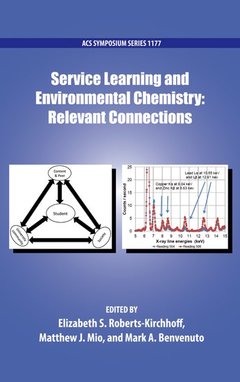Service Learning and Environmental Chemistry Relevant Connections ACS Symposium Series
Langue : Anglais
Coordonnateurs : Roberts-Kirchoff Elizabeth S., Mio Matthew J., Benvenuto Mark A.

Like many techniques and tools, service learning within chemistry courses is a way to help students supplement their education with a lasting appreciation for the subject matter they have learned. Perhaps the reason the traditional lecture continues to be a mainstay of higher education is because the students, faculty, and administrators are all very used to it. Adding a service-learning component to many chemistry courses may not be difficult, though. While it requires extra time outside the lecture hall or teaching laboratory, this increase appears to be more than offset by the depth of student learning, and by what experiences they take away from the course. The learned connections can be as varied as the faculty members who teach different chemistry lecture or lab courses, or who engage in associated research projects. There are many ways in which service learning can be incorporated into the chemistry curriculum, whether in the traditional lecture class, in laboratory classes, or in research projects. Environmental chemistry connections are also unmistakable, and serve as studies that are both practical and of concern to our students and other members of our communities. All such techniques and scenarios can enrich a student's learning experience, and be beneficial to some segment of the local population as well. In short, service learning can help move the study of chemistry away from a more traditional model to one that involves both learning and raising awareness of conditions in their shared environment. Service learning, therefore, is a powerful tool by which chemists can effect both pedagogical and social change.
Elizabeth Roberts-Kirchhoff is an Associate Professor of Chemistry and Biochemistry at the University of Detroit Mercy. Her research interests include the mechanism of action of cytochrome P450 enzymes; the analysis of metals in food and health supplements including kelp, clay, and protein powders; and the analysis of pesticides in water. Roberts-Kirchhoff received a B.S. in Chemistry from Texas A&M University and a Ph.D. in Biological Chemistry from the University of Michigan. After postdoctoral research at Wayne State University and The University of Michigan, she joined the faculty at the University of Detroit Mercy in 1997. Matthew Mio is an Associate Professor at the University of Detroit Mercy in the Department of Chemistry and Biochemistry. His research focuses on new transition metal catalyzed cross-coupling reactions. Projects include exploring both the mechanism and synthetic capabilities of these reactions, with particular emphasis on the generation of phenylacetylenes for use in nanoelectronics and supramolecular chemistry. He is also interested in studying the pedagogy of organic chemistry. Mio holds a B.S. in chemistry from the University of Detroit Mercy and a Ph.D. in organic chemistry from the University of Illinois at Urbana-Champaign. He was awarded a Mellon Fellowship to perform post-doctoral research and teaching at Macalester College (St. Paul, MN). Mio joined UDM's faculty in 2002. Mark Benvenuto is a Professor of Chemistry at the University of Detroit Mercy, in the Department of Chemistry & Biochemistry. His research thrusts span a wide array of subjects, but include the use of energy dispersive X-ray fluorescence spectroscopy to determine trace elemental compositions of aquatic and land-based plant matter, food and dietary supplements, and medieval and ancient artifacts. Benvenuto received a B.S. in chemistry from the Virginia Military Institute, and after several years in the Army, a Ph.D. in inorganic chemistry from the University of Virg
Date de parution : 10-2015
Ouvrage de 246 p.
16.1x22.8 cm
Disponible chez l'éditeur (délai d'approvisionnement : 21 jours).
Prix indicatif 195,39 €
Ajouter au panierThème de Service Learning and Environmental Chemistry :
© 2024 LAVOISIER S.A.S.



